SEO for Real Estate Business
In today’s digital-first real estate market, simply having a website is not enough; you need to ensure it’s visible. This is where SEO (Search Engine Optimization) for real estate becomes essential. By optimizing your site for search engines, realtors and agencies can attract serious buyers, outperform local competitors, and expand their lead pipeline. From basics to execution, this guide provides a complete roadmap for real estate SEO success.
How To Do SEO for Real Estate Website (Steps Gameplan)
Real estate is one of the most competitive online industries, and without effective SEO, your business may get buried beneath the competition. From showcasing properties to attracting high-intent buyers, SEO can help real estate professionals drive consistent traffic and generate qualified leads. Whether you’re focused on local SEO for real estate agents or want a broader SEO strategy for real estate, this guide will walk you through the essentials.
Already have a website? You can skip straight to Step 2.
Step 1: Building a Real Estate Website (If You're Starting Fresh)
Building a strong website foundation is the first step in effective SEO for realtors. A fast, mobile-friendly, and well-structured site improves user experience and helps Google index your pages efficiently. Using clean URLs, HTTPS, and optimized headings ensures your platform is ready to rank for valuable SEO keywords for real estate.
- Create a user-friendly site: Your site must be easy to navigate for users exploring property listings or researching neighborhoods.
- SEO-friendly theme: Choose lightweight, fast-loading WordPress themes if you want to get started easily.
- Mobile-friendly: Most property searches and inquiries now happen on mobile devices, so it’s important to ensure your website is easily accessible and mobile-friendly.
- Plan your website structure: Use clear categories like “Neighborhoods” etc. in your website. Some CMS and Website templates provide easy structure for realtors like you. For instance, below is the screenshot of a Luxury Presence website, allows real estate agents to add neighborhoods and areas of their choice.
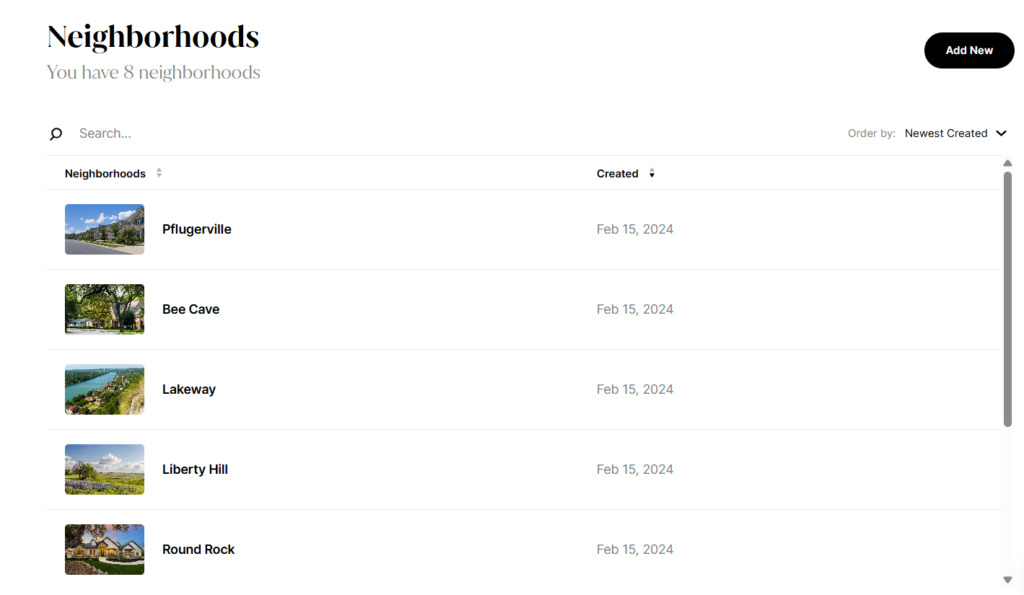
- A descriptive URL structure: Instead of formats like realestate.com/page?id=123, go for something more descriptive and relevant, like realestate.com/homes-in-austin
- Make sure you’re using HTTPS: Secure websites are trusted more by Google.
- Optimize headings and subheadings: Help both users and Google understand your content better.
It helps make your pages easier to read and more search engine-friendly
Step 2: Setup Website for Google
Set up accounts on Google Search Console and Google Analytics.
Google Search Console (GSC) is a free Google tool that helps you track, fix, and improve your website’s performance in search results.
How to do it:
- Visit Google Search Console
- Log in with your Google account.
- Select either “Domain” or “URL prefix” to add your website to Google Search Console..
- Verify ownership (recommended: DNS verification for full domain control).
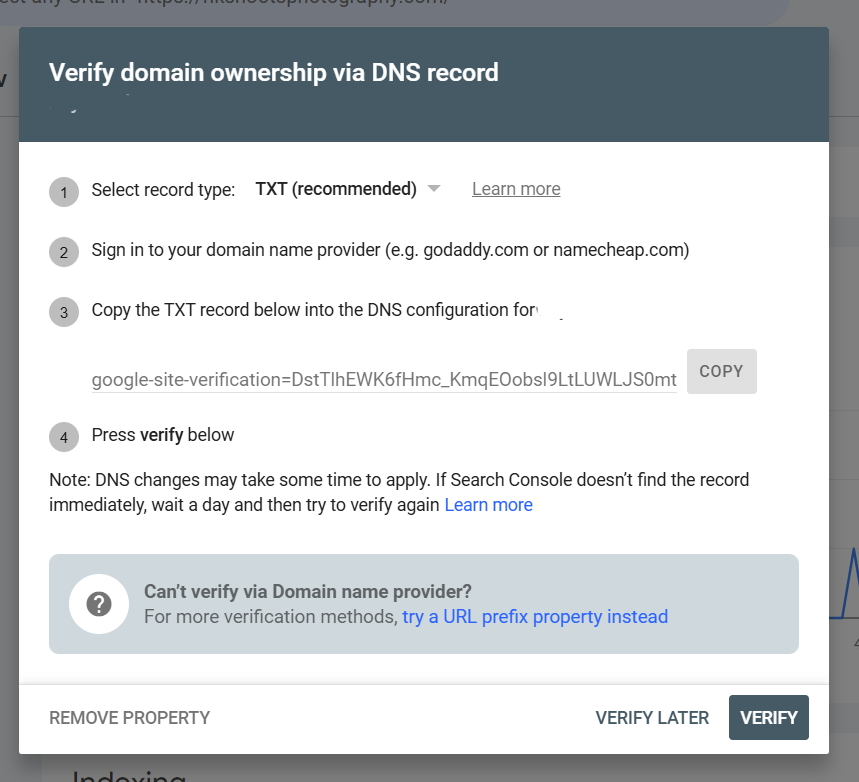
The images above show how to verify your Google Search Console account.
Why it matters:
Without GSC, you won’t have insights into how your real estate site performs in search—like what queries people use to find your listings or which pages aren’t indexed.
Similarly, set up your Google Analytics so you can view custom reports and dig deep into what’s happening in your website. It’s going to be crucial in the process of decision making about a page, services or products on your real estate website.
For example, below is a screenshot of our client, which shows the impressions growth (Dec-Jan compared with Sep month) of a newly found keyword in Google Analytics.
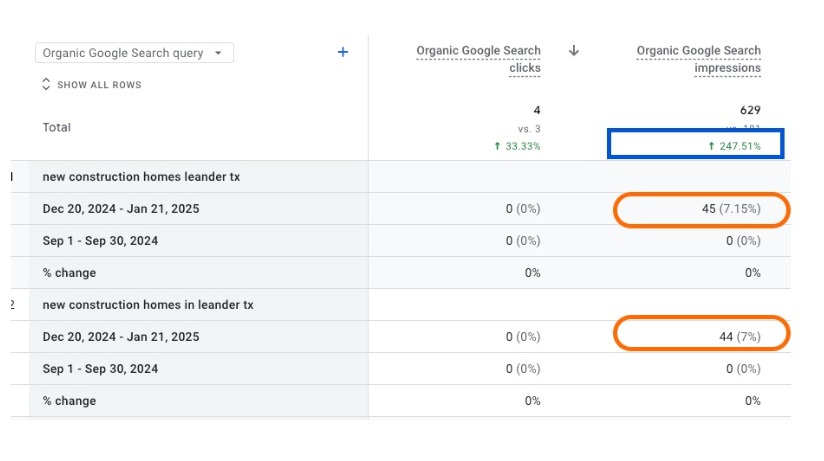
Submit Your Sitemap for Faster Indexing
A sitemap tells Google what pages exist on your site, making it easier for them to crawl and index your content quickly.
Ensure Your Site is Indexable and Crawlable
Sometimes, pages might be blocked by mistake—either in your robots.txt file or via “noindex” tags.
Checklist:
- Make sure important pages (home, category, property listings) are not blocked in robots.txt.
- Avoid “noindex” meta tags on key pages.
- Use the “URL Inspection” tool in GSC to check indexability.
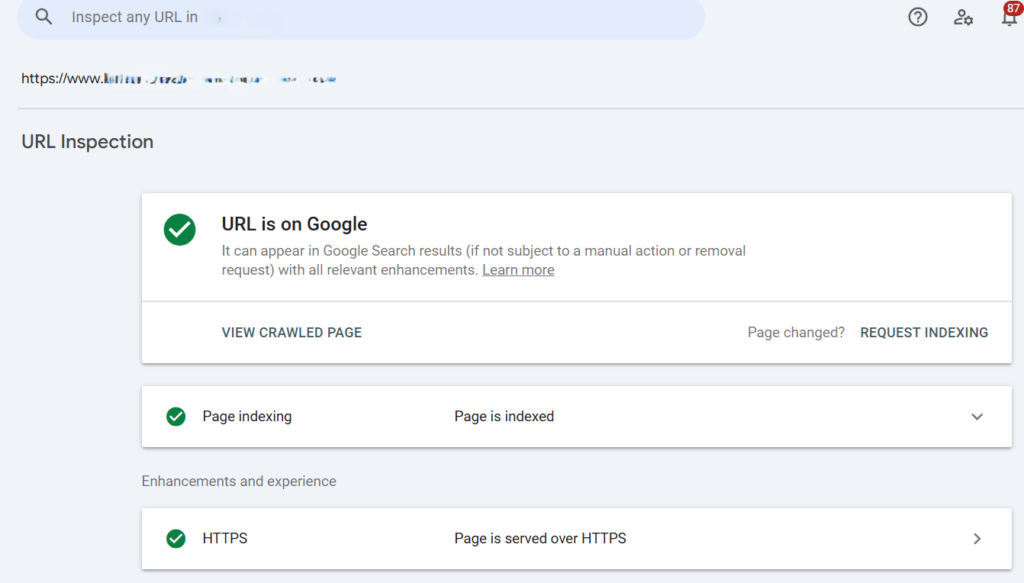
For example, you can check if your site page is indexed on Google using Google Search Console, as shown in the screenshot where it confirms “URL is on Google” and the page is indexed. If a page isn’t indexed, you can manually “Request Indexing” via GSC to speed up the process.
Add Schema Markup for Listings, Reviews & Agents
Structured data, such as schema, enables Google to better understand your page and enhance search listings with rich features.
Types to include:
- RealEstateAgent Schema: For individual agent profile pages.
- Product or Offer Schema: For property listings.
- Review Schema: For client testimonials or ratings.
- Organization/LocalBusiness Schema: For your business profile.
How to add:
- Use schema plugins (like “Schema Pro”) or embed JSON-LD code manually.
- Test your pages using Google’s Rich Results Test Tool.
Step 3: Expand Reach Beyond Google with Bing, Brave Search Engine
While Google dominates in the search engine space, you should also consider targeting Bing, Brave, Safari, and Yahoo users.
Submit your website to Bing Webmaster.
To submit your website to Bing Webmaster Tools, you will first need to log into your Bing Webmaster account, or create one. Go to “Add a Site”, and put your website URL in the box. Then we will need to verify that you own that site. There are several verified methods to verify ownership. Once you successfully verify ownership of your site, you will be able to submit it, and you can then track performance and find insights with the tool provided by Bing.
The image below shows the Bing search results for ‘“how much a mansion cost in Austin”, where our client’s website appears among the top with well-optimized titles and links.
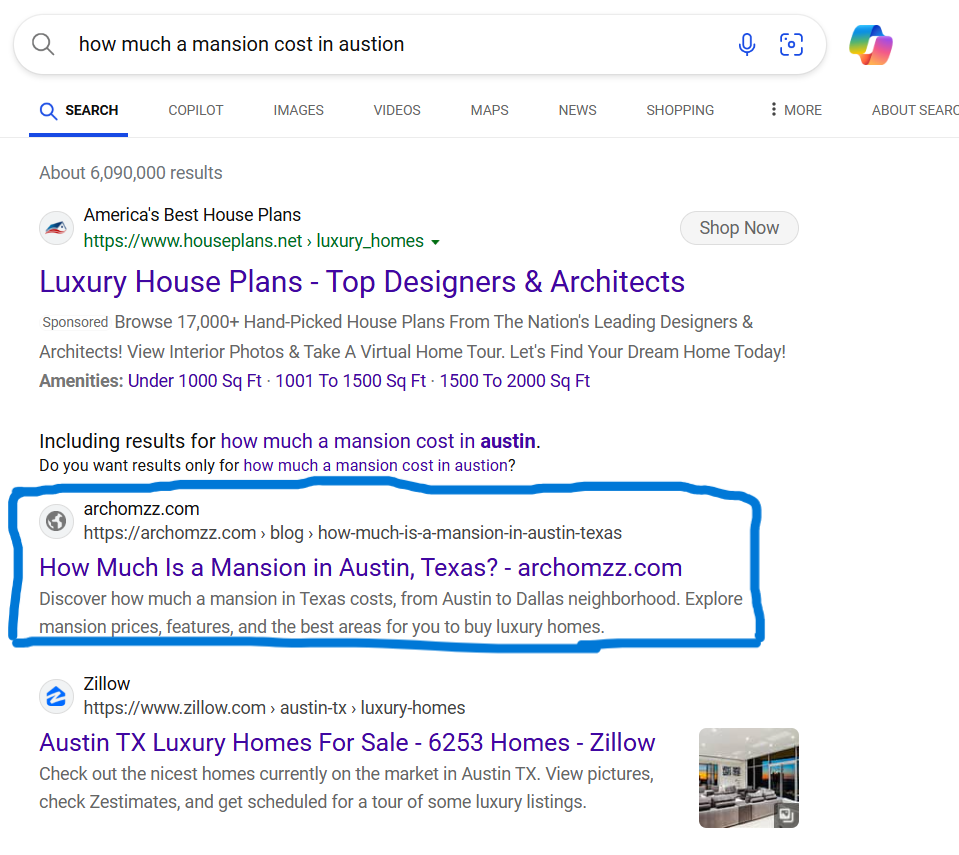
Explore Brave Browser's growing SEO opportunities
Brave Browser offers SEO potential by emphasizing privacy-focused search results and ad-free user experiences. As it gains popularity, optimizing for Brave Search can help reach tech-savvy and security-conscious audiences.
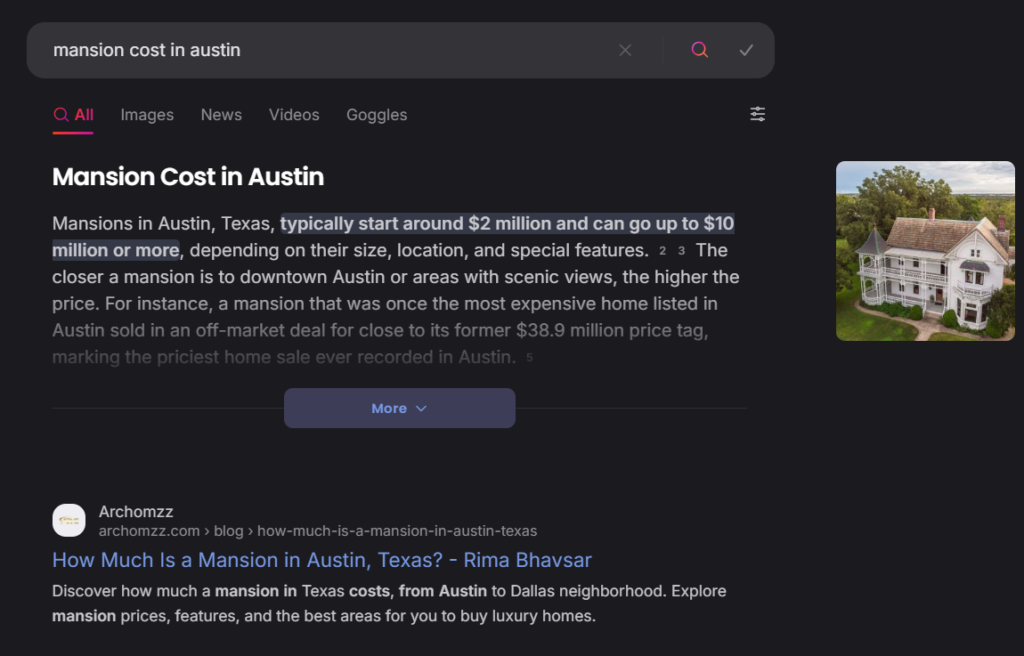
The image above displays Brave search results for ‘mansion cost in Austin’, with our client’s website ranking at the top. It prominently features Archomzz website, indicating effective SEO and strong site indexing.
Optimize for Yahoo SEO
Yahoo Search is now powered by Bing. So all webmaster tasks for Yahoo-including site submission, sitemap management and URL submission are handled through Bing Webmaster Tools.
Step 4: Technical SEO for Real Estate Websites
- Ensure mobile responsiveness (critical for property browsing): Mobile responsiveness ensures your website looks and works well on mobile devices. Since many property searches happen on smartphones, this is crucial for user experience and ranking.
- Optimize page speed: Faster pages improve user experience and reduce bounce rates. Use tools like Google PageSpeed Insights to identify and fix elements that slow down your site.
- Improve Core Web Vitals: Core Web Vitals measure the loading speed, interactivity, and visual stability of your pages. Optimizing these factors helps improve rankings and user satisfaction. You can use GTMetrix and Google Speed test to check LCP, and other metrics of core web vitals.
- Compress large property images: Large images can slow down your site, especially for property listings. Compressing images reduces loading times without compromising image quality, enhancing both SEO and user experience.
- Fix broken links and 404 errors: Broken links and 404 errors hurt user experience and SEO rankings. Regularly check your site for these issues and update or remove any faulty links to keep the site error-free.
- Use tools like Screaming Frog or Ahrefs to identify technical issues: These tools help identify broken links, duplicate content, missing metadata, and other SEO issues. Running regular site audits ensures technical issues are fixed promptly, maintaining your site’s performance.
Step 5: Local SEO for Real Estate Agents and Agencies
- Create and verify a Google My Business Profile: A Google My Business profile helps your agency appear in local searches and Google Maps. Verifying your profile ensures your business information is accurate and visible to potential clients.
- Maintain consistent NAP (Name, Address, Phone) info: Consistency in your NAP details across all platforms helps search engines trust your business’s location and legitimacy. This consistency boosts your local rankings and visibility.
To dive deeper into maintaining consistency and maximizing your local visibility, check out our detailed guide on building an effective citation strategy for local SEO.
- Get Listed on Real Estate Directories: Listing your business on real estate directories like Realtor.com, 99acres, and MagicBricks boosts your online presence and creates valuable backlinks. These directories also help increase visibility and drive more traffic to your site.
Step 6: Keyword Research for Real Estate
- Use tools like Google Keyword Planner, SEMrush: These tools help you identify relevant keywords with search volume, competition level, and trends. They are essential for building an effective keyword strategy tailored to your real estate business.
- Target real-life examples like: Use location-specific and property-type keywords like “2 bed apartment in Brasilia” to target buyers searching for specific listings if you’re a realtor based in Brasilia. These targeted keywords help you capture local search intent.
- Include long-tail keywords: Long-tail keywords are more specific and less competitive, which means they attract highly qualified leads. For example, targeting “buy sea-facing villa in Goa” will attract users with a clear buying intent.
- Focus on intent-based keywords: Intent-based keywords help you understand the motivations behind a user’s search, such as whether they’re researching neighborhoods or actively looking to buy. For realtors based in Saudi Arabia, “Best areas to live in Tabuk for families” caters to a user looking for family-friendly locations.
- Target SEO keywords for real estate to capture search demand: Identifying high-traffic real estate keywords ensures you’re meeting market demand. By targeting both broad and niche SEO keywords, you increase your chances of ranking and attracting potential clients.
Step 7: Content Strategy That Converts
- Build topical authority with location-specific guides: Location-specific guides help establish your website as an authority on particular areas, attracting local traffic. These guides provide valuable insights for users searching for detailed information about specific neighborhoods.
- Write engaging, informative content with clear visuals: High-quality content that is both informative and engaging keeps visitors on your site longer. Use clear visuals like property photos and infographics to break up the text and make the content more engaging.
We applied this strategy for our real estate client, Archomzz, by combining SEO-rich content with engaging visuals to boost user interaction and retention. For instance, blogs like “How much are property taxes in Austin” and “How to Buy a Home in Austin in 2025” feature informative content supported by infographics and property images, creating a more engaging and user-friendly reading experience.
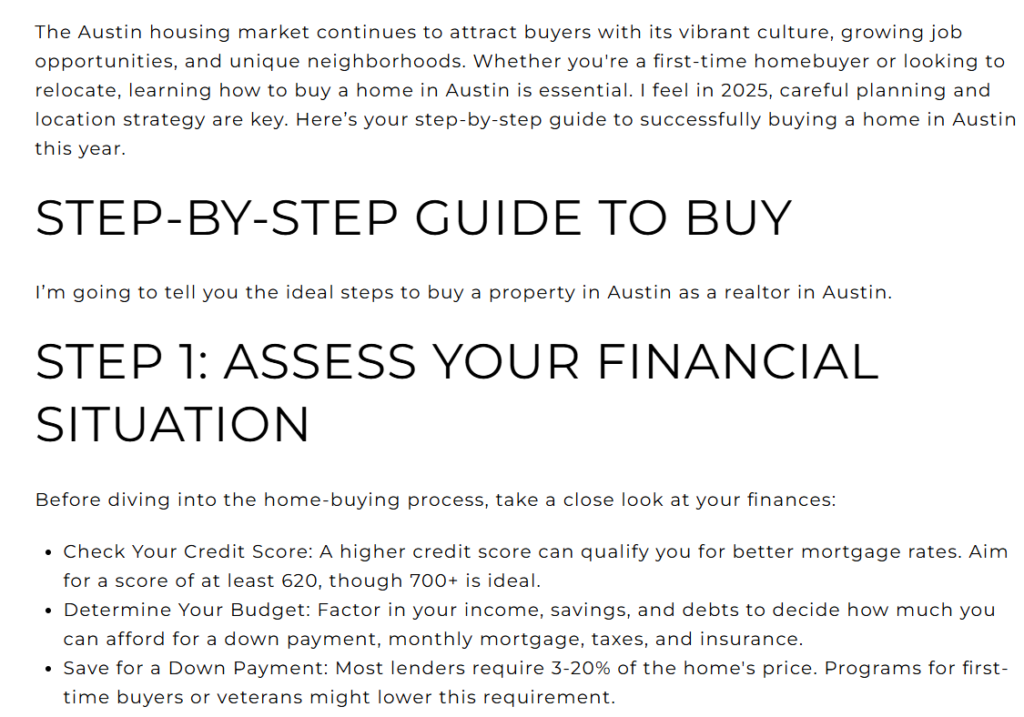
We’ve created an engaging and informative blog for our client, as shown in the image above, that guides homebuyers through a step-by-step process of purchasing property in Austin.
- Add FAQs: FAQs address common concerns and provide quick answers to potential buyers’ questions. Including FAQs on your site improves SEO, boosts visibility in voice search, and can land your site in featured snippets.
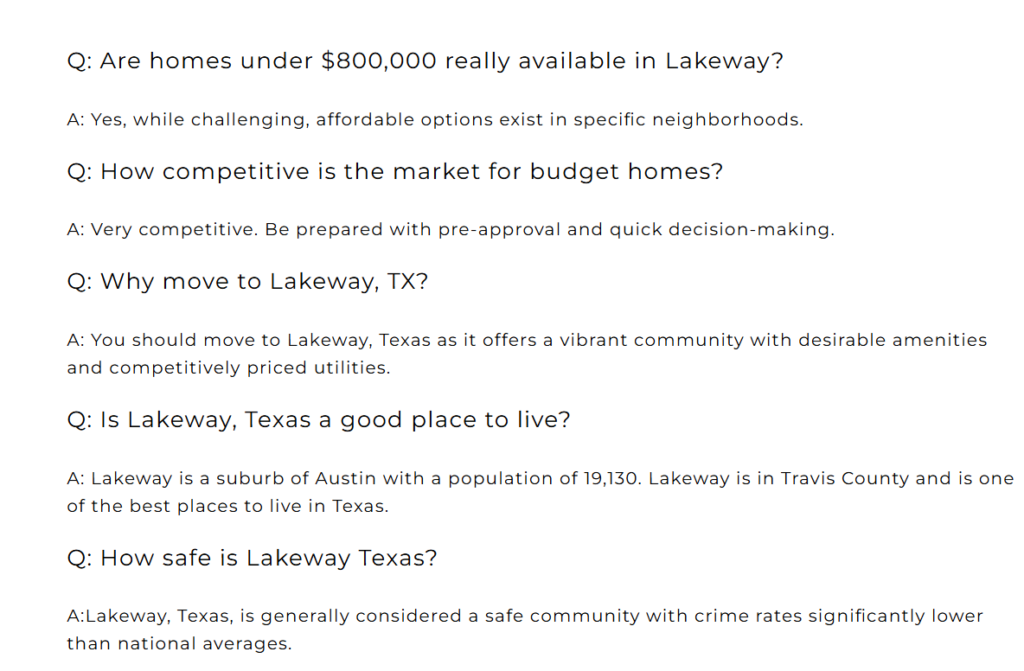
Like the FAQs we’ve included in this blog for Archomzz, our real estate client, these help address common buyer concerns and improve SEO.Adding clear, informative FAQs can also boost visibility in voice search and featured snippets.
- Regularly update old blogs using GSC data: Updating old content based on insights from Google Search Console (GSC) helps keep your information fresh and relevant. This practice ensures that your content continues to rank well and attract new traffic.
- Use local languages if targeting regional audiences: Incorporating local languages can significantly increase engagement with regional audiences. It helps make your content more relatable and accessible, improving user experience and SEO.
- Follow EEAT (Expertise, Experience, Authority, Trust): Google values content that demonstrates expertise, authority, and trustworthiness. Ensuring your content follows EEAT guidelines enhances its credibility, helping you rank higher in search results.
Step 8: On-Page SEO
- Optimize meta titles, meta descriptions, and headers: Craft compelling meta titles and descriptions that include target keywords to boost click-through rates. Use headers (H1, H2, etc.) to organize content and make it easier for search engines to understand your page.
- Interlink listings with blog posts and guides: Internal linking helps distribute page authority across your site and improves navigation for users.
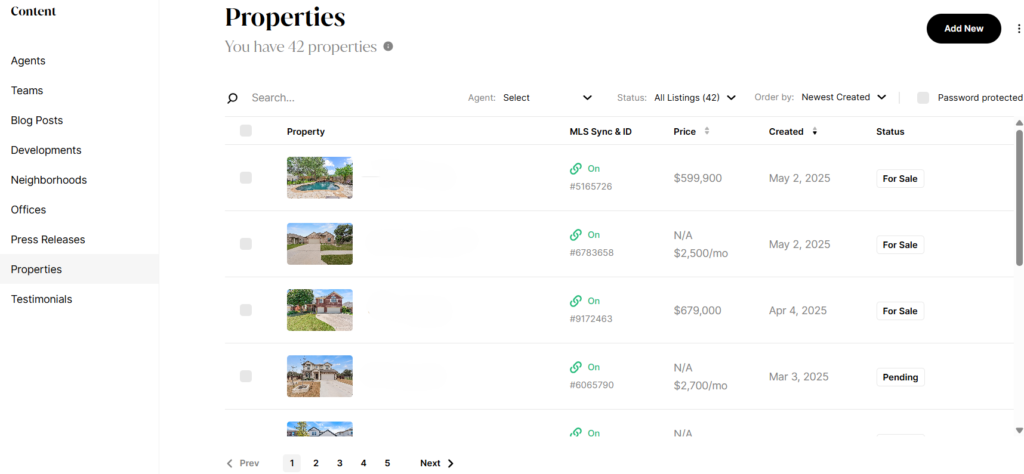
Linking listings with relevant blog content also enhances the user journey and SEO performance. Now, above listing could be linked in a blog so it helps audience to explore more about their needs as seen below.
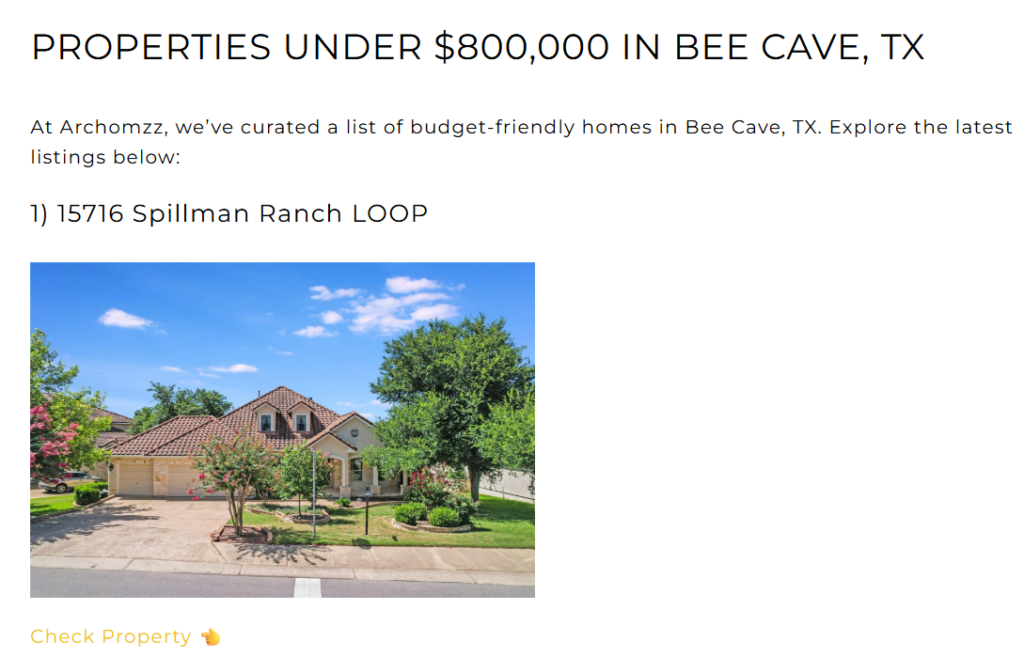
- Use engaging hooks in blog intros: Strong, relatable hooks grab readers’ attention and encourage them to read further. They also help search engines understand the content’s relevance to user intent.
- Add descriptive alt-text to images: Alt-text makes images accessible to screen readers and improves image SEO. Use clear, keyword-rich descriptions that reflect the content of the image. Luxury Presence, a CMS built for Real estate businesses have created a detailed guide about Image optimization.
- Implement schema markup like FAQs, Organization, Reviews, Listings: As we discussed in step 2, Schema markup helps search engines understand your content and display rich results like ratings and FAQs. Adding structured data boosts your visibility and credibility in search listings.
Step 9: Community Engagement (Off-Page SEO)
- Join Reddit threads: Engage in niche forums where buyers, sellers, and investors actively discuss your offerings, services or property trends. Sharing valuable insights helps build authority and can drive targeted traffic to your site.
For instance, if you are a real estate agent in Dubai, you can join the Dubai real estate subreddit to engage with potential customers.
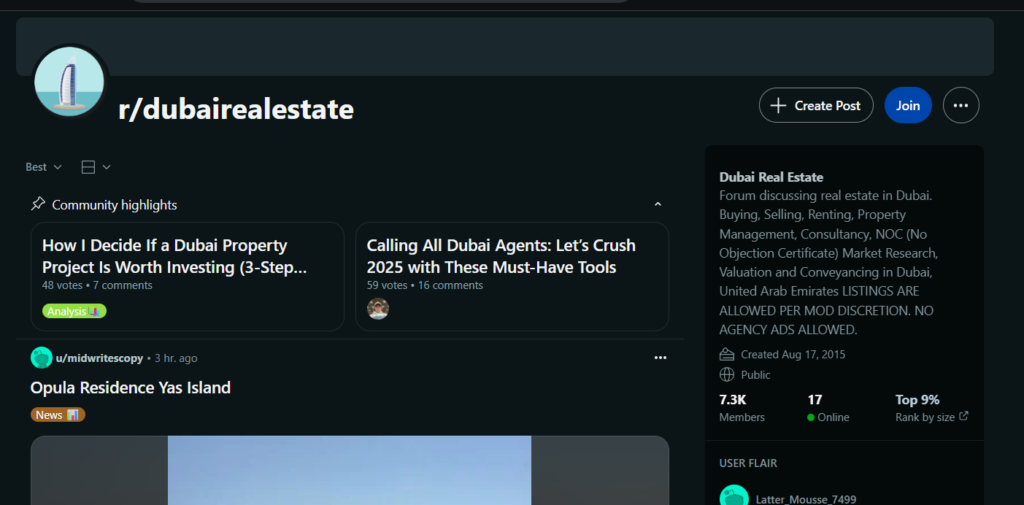
- Share listings or advice in Facebook groups: Facebook groups allow direct interaction with local property seekers. Consistently sharing listings or answering questions can position you as a trusted real estate expert.
- Quora Communities: Quora lets you respond to real buyer queries with informative answers and links. This builds backlinks and establishes your expertise in real estate.
- Engage in X (Twitter) communities: Participate in industry discussions and share updates or listings with relevant hashtags. Twitter helps amplify your content and connect with influencers or prospects.
- Join Telegram groups for property buyers and sellers: Telegram groups offer a direct channel to engage with highly interested leads. Share updates, deals, and tips to build trust and attract clients in real time.
Step 10: Link Building
- Submit your site to trusted real estate directories: Listing your website on credible directories like Realtor.com or MagicBricks helps build authoritative backlinks. These links improve your domain authority and drive referral traffic.
As we did for our real estate client Archomzz based in Texas, we created their business profiles on relevant online directories such as CallUpContact, Storeboard, and several others to enhance their local SEO and online visibility
- Guest post on real estate blogs (e.g., Housing.com blog): Writing guest posts on industry-relevant blogs allows you to share expertise and gain backlinks. It boosts visibility and positions you as a thought leader in real estate.
- Collaborate with local influencers and real estate YouTubers: Partnering with influencers helps you reach wider, engaged audiences. They can create content that links back to your site, increasing brand exposure and SEO value.
- Encourage clients to leave reviews on Google and industry portals: Reviews not only build trust but also generate user-generated content with natural backlinks. Google reviews also improve your local SEO rankings.
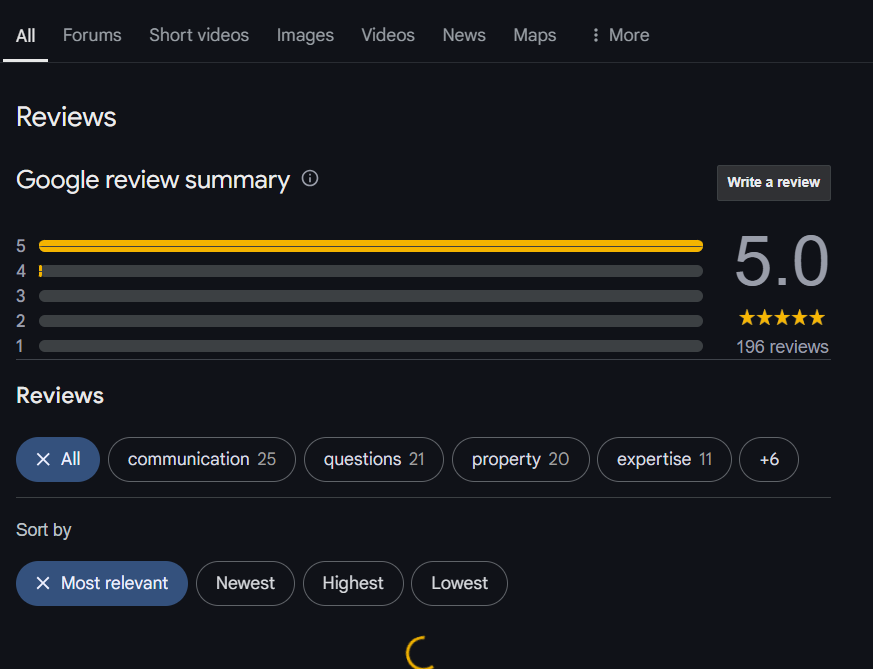
The image shows reviews of Archomzz, a real estate company, which helps build customer trust.
- Build contextual backlinks to boost SEO for real estate websites: Earn links from content that naturally relates to your niche like neighborhood guides or investment blogs. These contextual backlinks are more valuable for SEO and rankings.
Step 11: Track Performance with Google Analytics and GSC
- Monitor organic traffic sources: Use Google Analytics to see how many visitors come from search engines. This helps you measure the effectiveness of your SEO strategy. Similarly, Google Search Console (GSC) tells you about the queries which recently got your website more impressions so you can prioritize those keywords.
For example, here you can see that some of the search queries have got more impressions and all are related to Leander Texas so that’s a nice insight to make decisions about the content strategy and website optimization.
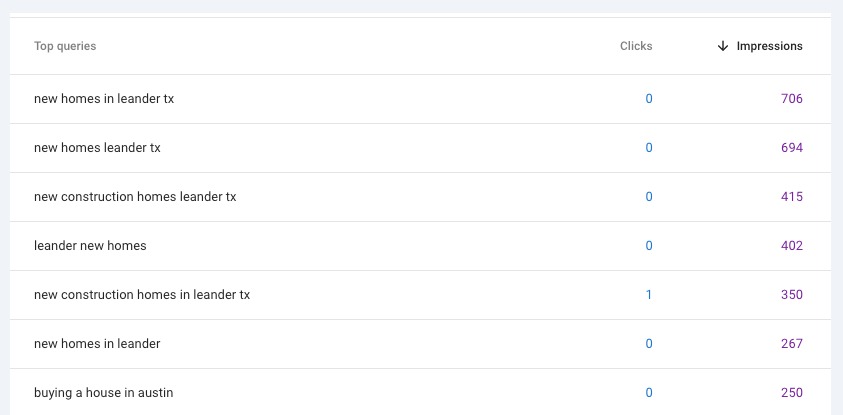
- Analyze referral traffic from directories and social platforms: Track visitors coming from sites like MagicBricks, Facebook, or Quora. It reveals which platforms drive the most qualified traffic.
- Track conversions (contact forms, inquiries): Set up goals to monitor actions like form submissions or property inquiries. This helps measure real ROI from your SEO efforts.
- Check user engagement metrics (avg. time, bounce rate): Analyze how long users stay on your site and whether they explore multiple pages. High engagement usually indicates helpful, relevant content.
Step 12: Optimize for Voice SEO and AEO
- Use natural, conversational phrases: Write your content the way people actually talk. Think about how someone might ask about home prices or neighborhoods; this helps your site show up in voice searches and feels more relatable to visitors.
For example, if your real estate business is in Delhi then instead of just “home in Delhi,” use long-tail queries like “Which is the best place to move in Delhi?” or “what is the price of homes in Delhi” to match how people search.
- Optimize for featured snippets: Featured snippets are the boxed information that appears at the top of some search results. By structuring your content with clear, concise answers to common questions, you increase your chances of being featured, which boosts visibility and attracts more traffic to your website.
- Implement HowTo and FAQ schema: Use structured data (schema markup) for any How-To guides or FAQs on your site. This helps Google understand your content better and can get your answers featured directly in search results.
- Structure content in a Q&A format to appear in voice search results: Format content like a conversation question first, then a clear, concise answer. This makes it easier for your site to get picked up by smart assistants like Alexa or Siri when users search by voice.
If you are a realtor in Riyadh, Saudi Arabia, you can include Q&A snippets like this in your website to improve your search visibility:
Example Q&A Snippet:
Q: What is the average cost of a 3 BHK flat in Riyadh?
A: The average cost of a 3-bedroom apartment (3 BHK) in Riyadh typically ranges from SAR 500,000 to SAR 1,500,000.
Cheatsheet of SEO Activities
Here’s the Table containing Activities that should be done at definite Frequency (like weekly, monthly, One-time) to ensure your SEO is in the right direction.
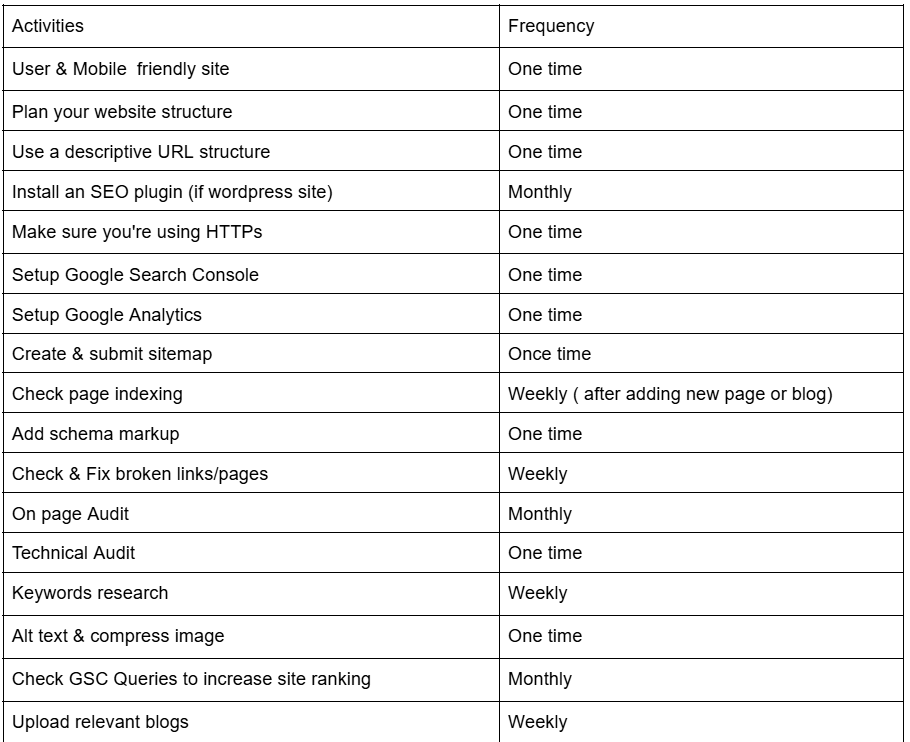
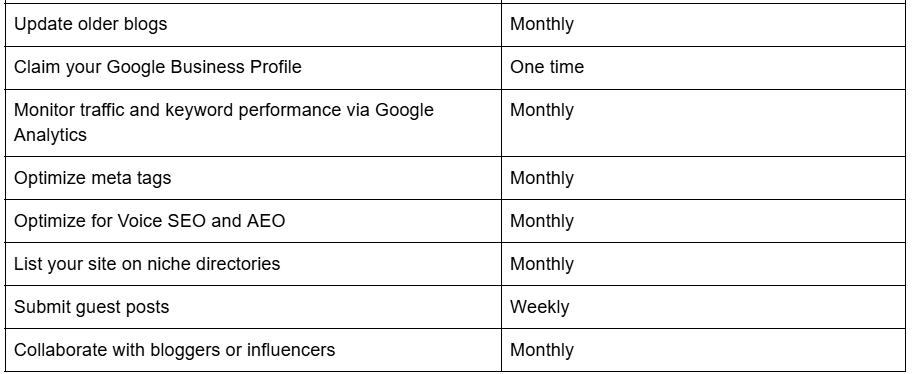
What Things You Should Avoid?
- Poor mobile experience or confusing UI: If your site is hard to navigate on phones, users will bounce quickly. This negatively impacts both user trust and search rankings.
- Slow-loading pages and uncompressed images: Pages that load slowly due to large image files or poor optimization frustrate users. Google also penalizes slow sites in its rankings.
- Spammy backlink strategies: Buying or exchanging low-quality links can lead to penalties. Always focus on building high-authority, relevant backlinks.
- Overuse of AI-generated, low-value content: Thin, repetitive content generated solely by AI can harm your SEO. Focus on quality, originality, and user intent.
- Keyword cannibalization : Targeting the same keyword across different pages confuses search engines. This dilutes ranking potential for all those pages. Example, if you’re a Mumbai based Real estate agent, targeting “Mumbai apartments for sale” on multiple pages should be avoided.
What Search Engines Are Best for Real Estate?
While Google dominates globally, Bing and Safari have a rising user base among Apple and desktop users. Brave and DuckDuckGo attract privacy-conscious property seekers. Diversifying your SEO beyond Google gives broader reach, especially for international property buyers.
Conclusion
Investing in SEO services for real estate agents isn’t optional, it’s essential for long-term digital growth. With the right SEO strategy, you can improve your visibility, build local trust, and convert more traffic into clients. With proven results in the real estate industry, we’re here to help you achieve desired results through SEO strategy. Let’s connect and discuss the same.

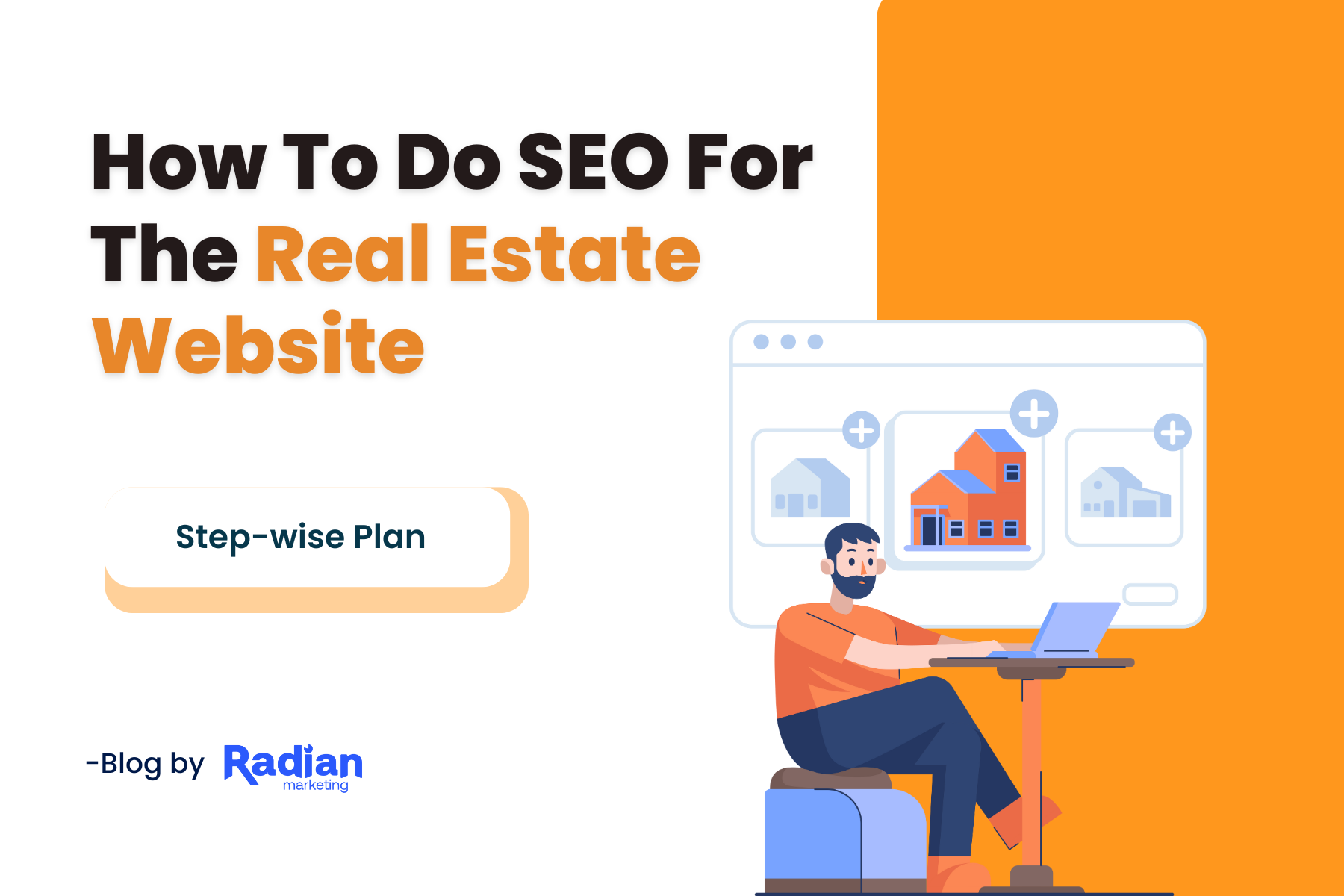

Bhaskar Gupta
Bhaskar Gupta is a passionate digital marketing practitioner and has keen interest in SEO, Social Media Strategy, Business Digital growth, and Performance marketing. He has worked with multiple brands in different industries across India and abroad. In 2022, he has set up his own digital growth and marketing agency named Radian Marketing.